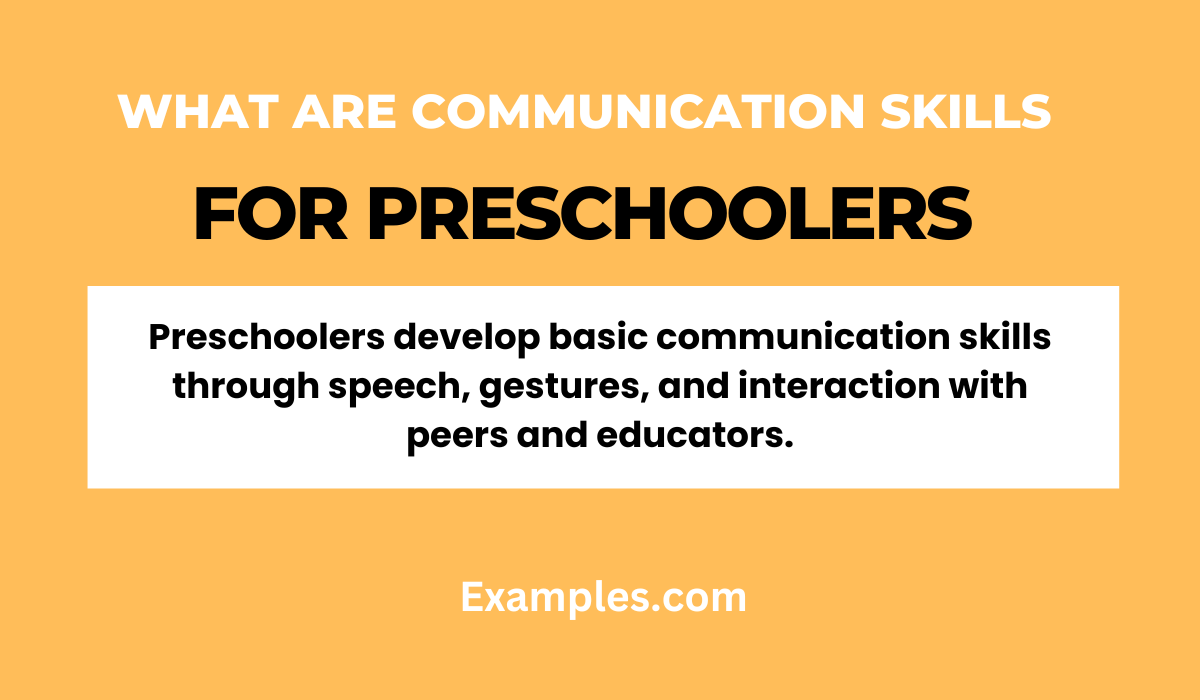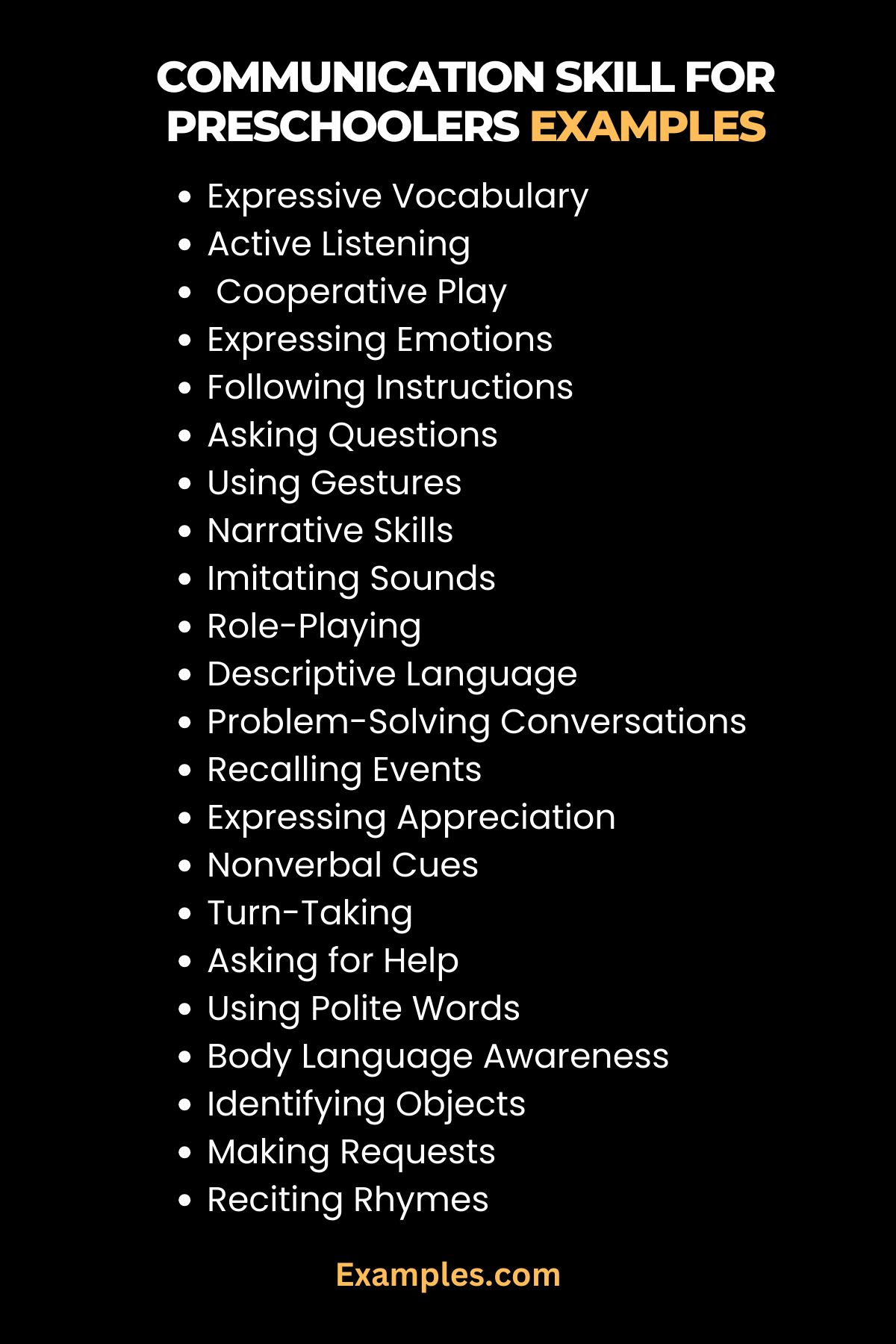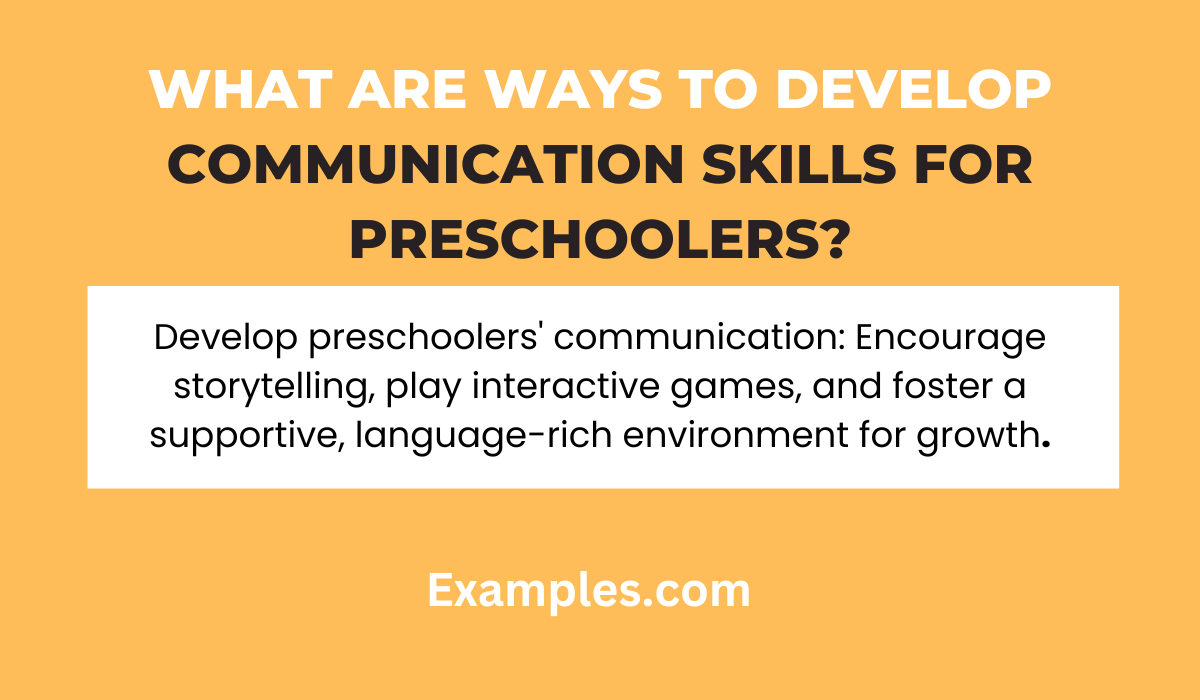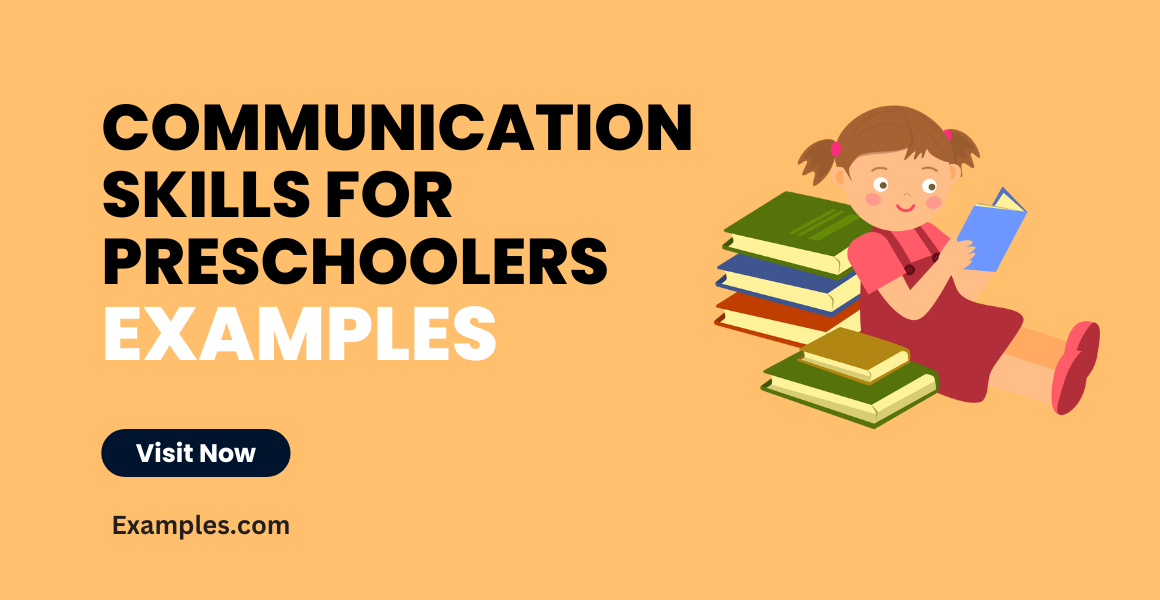29+ Communication Skills For Preschoolers Examples
Navigating the realm of communication skills for preschoolers is a delightful journey. From verbal expression to nonverbal cues, these skills lay the foundation for effective interaction. This comprehensive guide explores various facets, providing vivid communication examples and practical tips to nurture your child’s developmental growth.
What are Communication Skills for Preschoolers?

Communication skills for preschoolers encompass the ability to express thoughts, emotions, and needs through verbal and nonverbal means. In simpler terms, it’s how young children learn to convey their ideas, share feelings, and engage with others using a combination of words, gestures, and facial expressions.
30 Communication Skills for Preschoolers Examples
Unlock the potential of preschoolers with these communication skills examples, fostering language and social growth. From expressive vocabulary to active listening, each skill forms a building block for effective communication. Explore vibrant scenarios like a child enthusiastically sharing a favorite toy or using polite words during a playdate. These examples not only showcase their developing abilities but also provide insights into nurturing a robust foundation for future communication.

- Expressive Vocabulary: Encourage your preschooler to use a diverse range of words to express ideas and feelings. For instance, boldly describing a favorite toy as “gigantic” or “sparkling.”
- Active Listening: Practice listening attentively when a friend shares a story, demonstrating respect and understanding through eye contact and nodding.
- Cooperative Play: Engage in collaborative activities where children learn to take turns, share, and communicate effectively during games or building projects.
- Expressing Emotions: Help preschoolers identify and articulate emotions by using words like “happy,” “sad,” or “excited” to express their feelings.
- Following Instructions: Encourage adherence to simple instructions, fostering the development of listening and comprehension skills.
- Asking Questions: Stimulate curiosity by prompting questions like “Why?” or “How?” to enhance their understanding of the world around them.
- Using Gestures: Support verbal communication with gestures, helping convey ideas through hand movements or facial expressions.
- Narrative Skills: Develop storytelling abilities, encouraging preschoolers to create imaginative tales and share them with enthusiasm.
- Imitating Sounds: Foster language development by imitating various sounds, creating a fun way to explore phonetics and vocalization.
- Role-Playing: Encourage imaginative play where children act out different scenarios, enhancing their creativity and communication skills.
- Descriptive Language: Promote the use of descriptive words like “soft,” “loud,” or “fast” to enrich their vocabulary and communication clarity.
- Problem-Solving Conversations: Guide discussions that involve finding solutions to simple problems, encouraging critical thinking and effective communication.
- Recalling Events: Develop memory and communication skills by encouraging preschoolers to recall and share details of recent events or activities.
- Expressing Appreciation: Teach the importance of saying “thank you” and expressing gratitude in various situations.
- Nonverbal Cues: Explore the significance of nonverbal communication through activities like charades, emphasizing the role of gestures and expressions.
- Turn-Taking: Cultivate patience and communication by practicing turn-taking during play or group activities.
- Asking for Help: Empower preschoolers to articulate their needs by teaching them to ask for assistance when faced with challenges.
- Using Polite Words: Introduce courteous expressions like “please” and “excuse me” to instill good manners and effective communication.
- Body Language Awareness: Encourage understanding of body language by discussing how different postures convey various emotions.
- Identifying Objects: Enhance vocabulary by naming and discussing everyday objects, fostering language development.
- Making Requests: Teach preschoolers to make polite requests, such as asking for a turn or requesting a specific toy.
- Reciting Rhymes: Promote rhythmic speech through rhymes, enhancing language fluency and pronunciation.
- Sharing Experiences: Encourage preschoolers to share personal experiences, building confidence in expressing thoughts and feelings.
- Making Choices: Offer opportunities for decision-making, allowing children to communicate their preferences.
- Expressing Disagreement: Teach respectful disagreement by using phrases like “I don’t agree because…” to promote healthy communication.
- Puppet Play: Utilize puppets as a fun tool for communication, enabling children to express themselves through imaginative characters.
- Weather Observations: Discuss weather conditions, promoting language skills as children describe various weather phenomena.
- Singing Songs: Engage in singing sessions to enhance speech rhythm, pitch, and language development in a joyful manner.
- Categorizing Objects: Foster cognitive and communication skills by categorizing objects based on shared characteristics, encouraging descriptive conversations.
- Emotional Recognition: Develop emotional intelligence by exploring different facial expressions and discussing the corresponding emotions.
Communication Skills Examples for Preschoolers Children
Foster essential communication skills in preschoolers through engaging activities. Encourage storytelling, were children express ideas and emotions, enhancing verbal abilities. Use playtime to promote sharing, teaching cooperation and effective interaction. Implementing these activities empowers children to express themselves confidently, laying the groundwork for successful communication.
- Role-Playing Conversations: Encourage children to engage in pretend play, developing conversational abilities as they enact different roles.
- Show and Tell: Enhance communication by allowing children to showcase and describe items, promoting descriptive language and public speaking skills.
- Emotion Charades: Stimulate emotional expression through charades, prompting children to act out various emotions for peers to identify.
- Picture Description: Develop vocabulary and communication by having children describe pictures, facilitating language development.
- Count and Share: Promote numerical communication as children count and share objects during collaborative activities.
- Group Story Creation: Encourage teamwork by having children collaboratively create stories, enhancing communication and social skills.
- Color Naming Game: Enhance language skills by engaging children in activities where they identify and name different colors.
- Mimicry Challenge: Develop communication by having children imitate each other’s movements, fostering observational and verbal skills.
- Nature Exploration Talks: Promote curiosity and expression by discussing nature findings during outdoor exploration sessions.
- Memory Match Narration: Strengthen communication as children articulate the connection between paired memory cards during a matching game.
Communication Skills Examples for Preschoolers Activities
Enriching activities play a pivotal role in developing preschoolers’ communication skills. Through games like “Simon Says,” children learn to follow instructions, enhancing listening skills. Artistic endeavors, such as drawing and painting, encourage self-expression. These activities create a dynamic learning environment, where preschoolers naturally acquire and refine their communication abilities.
- Puppet Show Interaction: Enhance communication through puppetry, allowing children to engage in dialogue with puppets and peers.
- Collaborative Artwork Explanation: Foster teamwork and expression as children jointly explain their collaborative artwork to the group.
- Obstacle Course Communication: Promote verbal interaction during obstacle courses, where children navigate challenges while communicating with peers.
- Cooking Class Descriptions: Develop language skills as children describe ingredients and cooking steps during a preschooler-friendly cooking class.
- Building Block Dialogue: Stimulate communication by having children discuss their block creations, promoting descriptive language.
- Weather Discussion: Encourage conversation about weather patterns, fostering observation and descriptive skills.
- Interactive Song Sessions: Utilize music to promote communication as children sing and discuss the lyrics of interactive songs.
- Sensory Bin Exploration Talks: Enhance language by having children articulate their sensory experiences during exploration with sensory bins.
- Dress-Up Drama: Encourage imaginative communication as children engage in dramatic play with costumes, creating dialogue.
- Story Circle: Foster communication in a circle, where each child contributes a sentence to collectively create a unique story.
Communication Skills Examples for Preschoolers in the Classroom
In the classroom setting, intentional activities shape communication skills in preschoolers. Circle time discussions promote listening and responding, fostering effective communication. Interactive educational games like alphabet puzzles encourage verbalizing thoughts. Incorporating these activities in the classroom cultivates an atmosphere where preschoolers thrive in developing strong communication skills.
- Daily Journal Sharing: Encourage communication by having children share their daily journal entries, promoting reflection and expression.
- Morning Greeting Conversations: Stimulate verbal interaction through morning greetings, allowing children to share experiences and emotions.
- Circle Time Storytelling: Develop communication skills as children participate in circle time, taking turns to share and listen to stories.
- Showcasing Artwork Talks: Promote expression as children explain their artwork during designated showcasing sessions in the classroom.
- Group Learning Discussions: Enhance communication through group discussions, where children share thoughts and ideas on various topics.
- Classroom Jobs Description: Foster responsibility and communication by having children explain their assigned classroom jobs to the group.
- Alphabet Show and Tell: Promote language development by having children bring items that start with a designated letter and explain their choices.
- Classroom Rules Review: Reinforce communication skills as children discuss and articulate classroom rules during interactive sessions.
- Calendar Time Dialogue: Develop language and time-related communication during calendar sessions where children discuss days, months, and events.
- Collaborative Project Presentation: Encourage teamwork and communication as children present collaborative classroom projects to the entire class.
What are ways to Develop Communication Skills for Preschoolers?
Communication skills are crucial for a child’s overall development, and preschool is a pivotal time to foster these abilities. Effective communication lays the foundation for academic success, social interaction, and emotional well-being. In this guide, we’ll explore various ways to develop and enhance communication skills for preschoolers. Before delving into strategies, it’s essential to recognize why communication skills are vital for preschoolers. Strong communication skills empower children to express themselves, build relationships, and navigate the world around them. These skills contribute to cognitive development, academic achievement, and emotional intelligence.

Ways to Develop Communication Skills for Preschoolers
1. Encourage Verbal Expression
- Create an environment where children feel comfortable expressing themselves verbally.
- Engage in open-ended conversations, allowing them to share thoughts and feelings.
- Encourage storytelling and imaginative play to stimulate language development.
2. Read Aloud Regularly
- Reading aloud exposes children to a rich vocabulary and diverse language structures.
- Discuss the story, characters, and plot to enhance comprehension and communication.
3. Introduce Vocabulary Building Activities
- Incorporate word games, flashcards, and interactive activities to expand their vocabulary.
- Explore themes and topics that interest them to make learning enjoyable.
4. Promote Active Listening
- Teach the importance of listening attentively when others speak.
- Use games and activities that reinforce listening skills, such as “Simon Says.”
5. Engage in Role-Play
- Role-playing scenarios help preschoolers practice communication in different contexts.
- Provide props and encourage them to take on various roles to enhance creativity.
6. Utilize Technology Wisely
- Introduce age-appropriate educational apps and interactive digital media.
- Supervise screen time and ensure it complements communication skill development.
7. Organize Group Activities
- Group activities foster social communication, cooperation, and teamwork.
- Plan playdates, group games, and collaborative projects to enhance interaction.
8. Provide Constructive Feedback
- Offer positive reinforcement for effective communication.
- Gently correct pronunciation or grammar without discouraging their efforts.
9. Support Non-Verbal Communication
- Emphasize the importance of body language and facial expressions.
- Use visual aids, gestures, and facial cues to enhance communication understanding.
What should be Included in Communication Skills for Preschoolers?
1. Language Development
- Vocabulary expansion
- Grammar and sentence structure
- Phonological awareness
2. Listening Skills
- Following directions
- Understanding and responding to spoken language
- Recognizing and interpreting verbal cues
3. Social Communication
- Turn-taking and sharing during conversations
- Understanding and expressing emotions
- Respecting others’ perspectives
4. Cognitive Communication Skills
- Problem-solving through communication
- Critical thinking in verbal interactions
- Expressing thoughts and ideas coherently
5. Technological Communication
- Basic understanding of digital communication tools
- Responsible and supervised use of technology for learning
Why Should Preschoolers Learn Communication Skills?
Communication skills are a crucial aspect of a child’s development, laying the foundation for future success in both personal and academic realms. Here’s why it’s essential for preschoolers to start honing their communication skills early on:
1. Cognitive Development:
Developing communication skills enhances cognitive abilities. It stimulates the brain, fostering better understanding and processing of information.
2. Social Interaction:
Communication is key to socializing. Preschoolers who can express themselves effectively are more likely to engage positively with peers, building essential social skills.
3. Academic Readiness:
Effective communication is a fundamental aspect of academic success. Preschoolers who can articulate their thoughts and feelings are better prepared for the learning journey ahead.
4. Emotional Expression:
Communication provides an outlet for emotional expression. Preschoolers who can express their emotions verbally are better equipped to navigate and understand their feelings.
5. Conflict Resolution:
Learning to communicate helps preschoolers resolve conflicts peacefully. They can express their needs and understand others, fostering a cooperative and harmonious environment.
6. Building Confidence:
Effective communication boosts confidence. Preschoolers who can communicate clearly feel more self-assured, which positively influences their overall development.
Tips for Effective Communication Skills for Preschoolers
Now that we understand the importance, let’s delve into practical tips to nurture and enhance communication skills in preschoolers:
1. Encourage Active Listening:
Teach preschoolers the importance of listening attentively when others are speaking. This sets the foundation for understanding and responding appropriately.
2. Use Visual Aids:
Incorporate visual aids like pictures and charts to help preschoolers grasp and remember new words. Visuals enhance comprehension and make learning more engaging.
3. Promote Storytelling:
Encourage preschoolers to express themselves through storytelling. This not only enhances language skills but also fosters creativity and imagination.
4. Create a Language-Rich Environment:
Surround preschoolers with a variety of words and phrases. Reading books, singing songs, and engaging in conversations expose them to diverse vocabulary and sentence structures.
5. Provide Positive Feedback:
Acknowledge and praise preschoolers when they communicate effectively. Positive reinforcement boosts their confidence and encourages continued efforts.
6. Engage in Play-Based Learning:
Use play as a tool for communication development. Play-based activities facilitate interaction, cooperation, and the use of language in a natural and enjoyable setting.
7. Model Good Communication:
Serve as a role model by demonstrating effective communication. Use clear and simple language, maintain eye contact, and exhibit patience when engaging with preschoolers.
8. Introduce Turn-Taking:
Teach the concept of taking turns during conversations. This helps preschoolers understand the dynamics of communication and promotes respectful interaction.
9. Explore Various Communication Styles:
Expose preschoolers to different forms of communication, including verbal, non-verbal, and written. This broadens their understanding of how to convey and interpret messages.
10. Celebrate Diversity:
Embrace diversity in language and communication styles. Encourage preschoolers to learn words from different languages, fostering an inclusive and culturally aware communication approach.
In conclusion, nurturing communication skills in preschoolers is vital for their cognitive, social, and emotional development. Employing interactive methods like storytelling, active listening, and play-based learning fosters a strong foundation. By creating a language-rich environment and providing positive feedback, caregivers contribute to a child’s confidence and proficiency in communication. This guide serves as a comprehensive resource, offering practical examples to empower parents and educators in cultivating effective communication skills in preschoolers.



